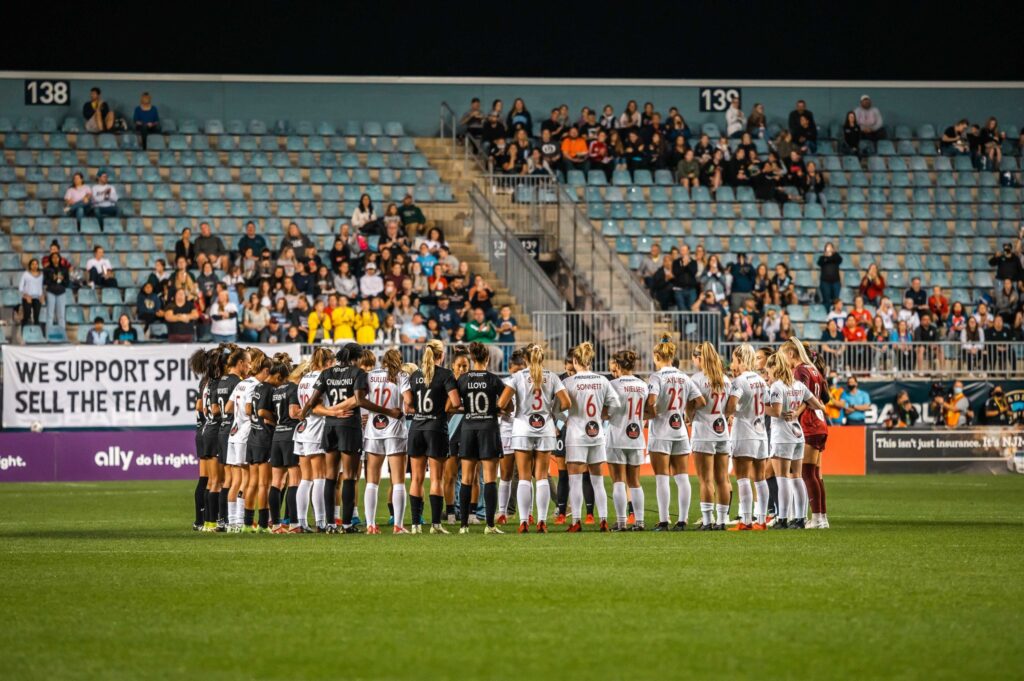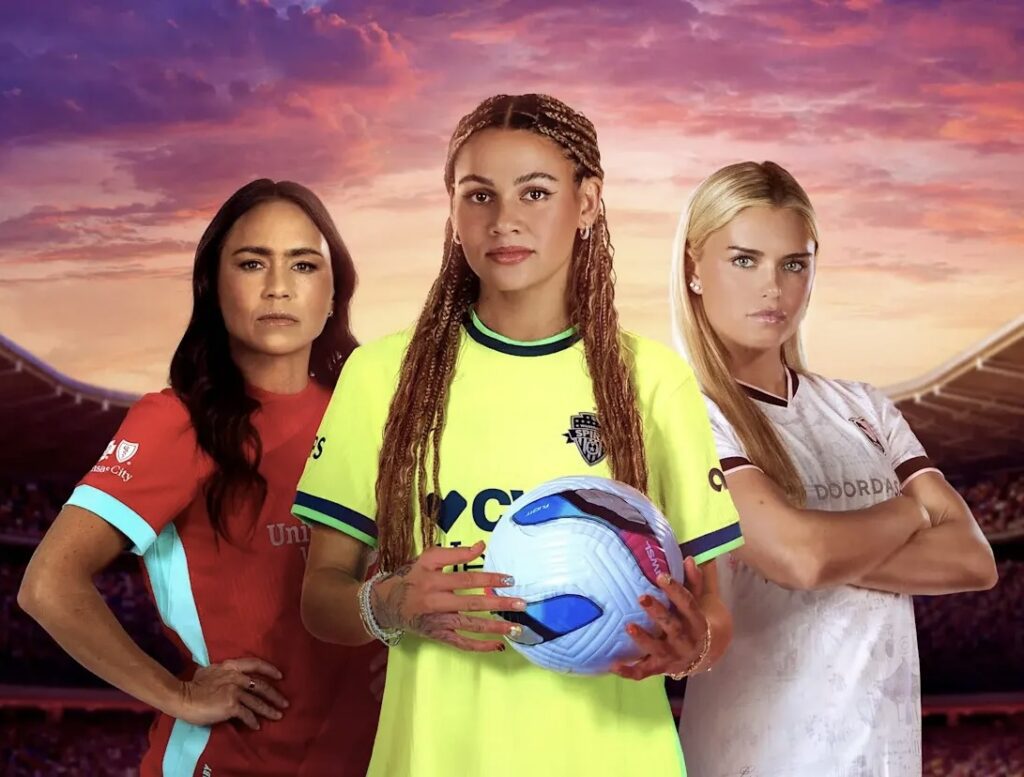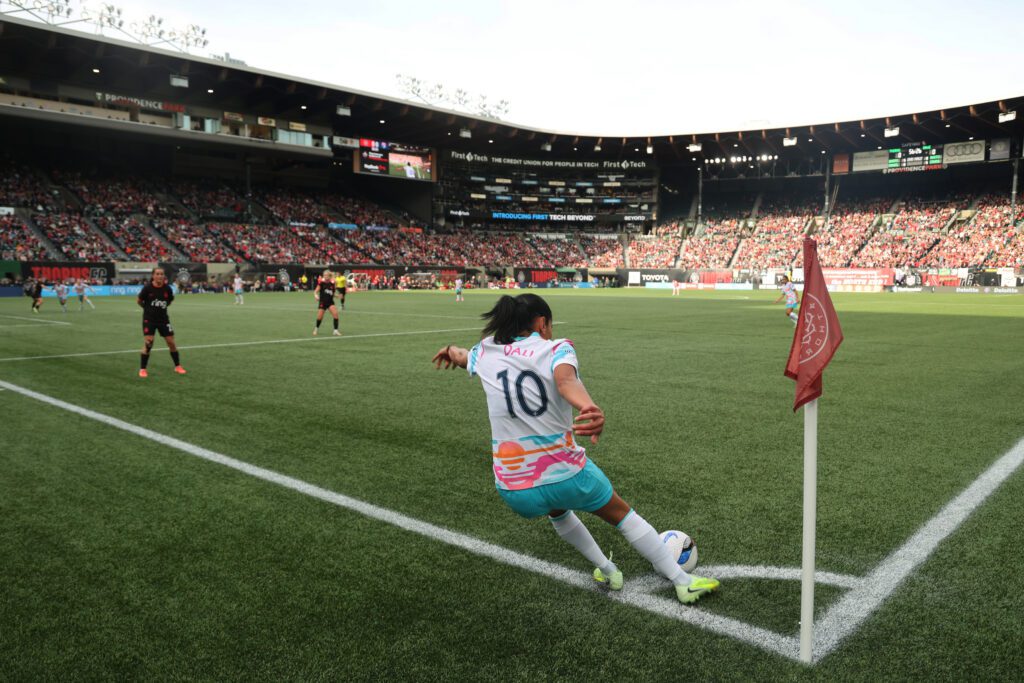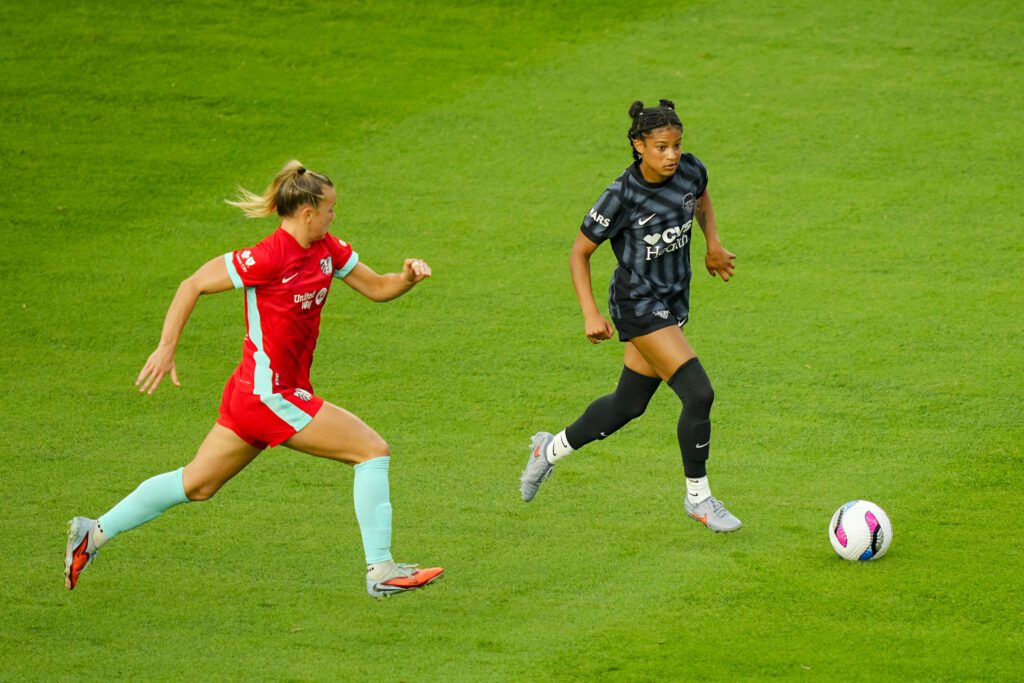When the NWSL Players Association decided to resume games on Oct. 6, less than a week after The Athletic’s report on former North Carolina Courage coach Paul Riley changed the league forever, players knew it couldn’t be just another game day.
“We started from that premise, just this feeling that this is not business as usual. We need to acknowledge what’s happening in this moment,” PA Executive Director Meghann Burke tells Just Women’s Sports.
The players’ collective demonstration — interlocking arms in the center circle for a moment of silence in the sixth minute of every game — was powerful in both its simplicity and its pointedness. The sixth minute signified the six years it took for Mana Shim and Sinead Farrelly’s stories of sexual coercion and emotional abuse to be told. But before the players showed their support on the field, the concept went through a number of iterations in a series of league-wide conversations.
Players had different ideas about what felt appropriate, ranging from the length of the demonstration to the act of solidarity itself. Finding a solution that worked for every player meant going beyond a simple majority.
“In a labor union, typically it’s majority rules. It’s a mini-democracy: Take a vote and you sort of go with what the majority wants to do,” Burke says.
But in a group of players with many different backgrounds, they knew they needed to be mindful of every person’s story, even the ones they weren’t aware of.
“When we thought about how it felt for one person or one team or one group, it didn’t feel right because it was too painful or too hard,” Burke says. “And so we immediately pivoted and evolved the conversation … [The demonstration] needed to be something that would feel healing and restorative and powerful, and the intention was not to cause more pain.”
The PA has taken what it calls a “trauma-informed” approach, making sure players feel supported as they close out the regular season this weekend and move into the postseason.
They’ve made a sports psychologist available to all players (some clubs have also provided their own). And they are pushing on the league to carry out investigations into past behavior, establish hiring protocols that vet candidates and work together to ratify the league’s first collective bargaining agreement, all with the intention of creating an environment where this sort of pain can never be inflicted again.
“One of the things that keeps me up at night is we’ll probably never know the full extent and scope of the damage that’s been done,” Burke says. “And so I think all of us have an obligation to be providing as many resources, not just to players but to youth soccer players, to parents, to coaches.
“This is the kind of thing that should rock not just our league, but our sport.”
Burke and the PA have the nearly impossible task of processing the intense emotions the Riley story evoked and pushing forward to reform the structures that enabled his behavior and that of other NWSL leaders found in violation of the league’s anti-harassment policy. To Burke, though, there is reason for cautious optimism about what happens next.
“I don’t think that the pain and anger that players have felt has subsided. I think this is too big of an issue for a few weeks to change that,” she says. “But I will say that our players and the Players Association is feeling very determined. We are bullish on the future of NWSL, but it’s got to be a league that is rebuilt around players, by players and for players.”

Last week, the NWSL announced Marla Messing as its new interim CEO. She and club representatives have been present for the most recent round of CBA negotiations. Burke senses a new level of urgency in what she calls “a change of the guard,” when prior to the stories of abuse coming out, NWSL owners were inexplicably absent from CBA meetings.
“We now have clubs themselves at the bargaining table, which makes a huge difference,” Burke says. “I think they are coming to understand that some time has been lost, and there needs to be a significant uptick in the pace that this negotiation is moving. I do believe that they are working very hard to make up for that lost time.”
Burke knows that setting standards for player wages and rights through the CBA will be essential to creating more equitable power dynamics. She also recognizes that the league needs to make substantial changes to its hiring practices at every level, so that situations like Riley’s and Richie Burke’s with the Washington Spirit don’t happen again. That includes stricter policies and a commitment to transparency.
“It’s clear that the recent hiring practices and systems have failed players, and it has put people in harm’s way. And that’s something that requires an urgent and immediate response. It can’t wait for a CBA to be negotiated and resolved,” Burke says.
“There is a lot of anger, and there’s a lot of hurt, but there are also a lot of unanswered questions. That’s why the investigation is so important, because we need to understand who knew what and who knew what when, and why this was allowed to happen.”
Messing said the league had agreed “in principle” to the PA’s demands of a league-wide investigation that answers directly to the players. Burke confirmed Messing’s statement, though she says they still need to work out some details. Messing added that she wants the input of the PA and the Black Women’s Player Collective in decision-making, including the naming of a commissioner.
The investigations into league and club conduct will take time, as will the understanding of what past investigations have found. The process requires a level of transparency the NWSL hasn’t adopted until now.
“I have no idea what Portland’s investigation found in 2015. I’ve never seen it. I’ve never seen the results of the investigation of the Sarah Gorden situation in Houston earlier this year,” Burke says. “I’ve never seen source materials, witness interviews, things of that nature that will help us understand what went wrong.”
The PA is committed to approaching the results of the league investigation with an open mind and wants to stick to the facts of each case as much as possible. Beyond that, accountability comes with consequences. The presence of new faces in the league office, at least, has helped push other important conversations forward.
“I think that the people who have come to the bargaining table themselves are committed to finding solutions. I have no reason to think that they themselves have contributed to some of the bad acts that we’ve learned about,” Burke says. “The question is whether they’ll be able to pull the rest of the league along with them.”
While the PA focuses on formally addressing the systems that have allowed abuse to perpetrate women’s soccer, the players are proving their resiliency and influence in their own way.
The Black Women’s Player Collective launched a new website this month with presenting partner Adidas and has continued to push for the creation of 12 mini-pitches across the country by the end of 2021, most recently holding a clinic in Louisville. While closing out the NWSL season, they’re organizing their thoughts as a collective so that, when they do speak with the league, they’re ready.
“I think we’ve realized that the league is a bit out of sorts right now, so pushing from our side is one thing that we want to do,” Washington Spirit defender Tegan McGrady told local reporters after the team’s Oct. 13 match. “But [the BWPC] also know that we want to make sure that we have everything that we need so that when we do go to them, we are collective as one, and we can make sure that we’re asking for everything that we want at once.”
After the same match, Spirit midfielder and PA President Tori Huster emphasized that solidarity has been key to communication. “I don’t think checking in with players across the league is hard,” she said. “I think one of the things throughout this entire thing that is a positive is that we’ve been really collective in our efforts, and that only is possible because we’ve been communicating so frequently.”
McGrady noted that Huster had been on the phone non-stop as games resumed, which Huster admitted hasn’t been easy.
“I’m not sure that I could have ever imagined something like this in my career before. It is hard,” Huster said. “Even with our #NoMoreSideHustles campaign, we are able to multitask. A lot of us have other jobs. But I think if you factor in some of this — just the processing, the fact that this is super draining for us, and we’re expected to go out on the field and perform at a high level, at a professional soccer level — I don’t think we should have to do that, but we are doing it.”
Players across the league have said how grateful they are for the PA’s advocacy. For Burke, the feeling is mutual.
“Our teams are just extraordinary people. They’re smart, they’re compassionate, they’re deep,” she says. “We represent a diverse group of people. And what you’re finding is that our players are committed to supporting one another and allowing each other space to feel differently and to move through this differently, but to ultimately stand together, speaking out against this horrible thing that has been allowed to happen that can never happen again.”
Each side has moved quickly to commit to systematic change. What comes next, however, might more so resemble the rebuilding of a soccer league in a new and better image.
Burke was a player when the Women’s United Soccer Association and Women’s Professional Soccer folded in succession, in the years before the NWSL emerged as the longest-running women’s professional league in the U.S. Her faith in the NWSL’s future comes not only from the players but also from the feeling that, this time, there are too many invested fans and sponsors sticking by them for it to fail.
“What I would say to fans is: Yes, please buy season tickets, please come to games, please show that you’re going to demand a league that is rebuilt by, for, and around players. And you’re not going to be silent, and you’re not going to run away, because that’s the easiest way for these systems to become re-entrenched,” she says.
“I mean this sincerely with every fiber in my being that we can build a better league, and we will build a better league. And it’s because players are demanding it, but it’s also because fans and sponsors have our backs.”
Claire Watkins is a contributing writer at Just Women’s Sports covering soccer and the NWSL. Follow her on Twitter @ScoutRipley.




